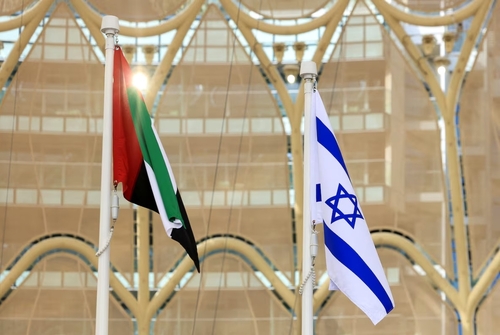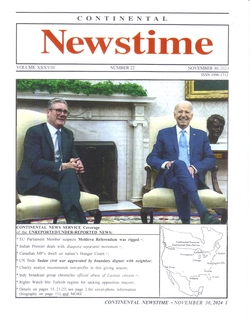Continental Newstime: Prime Minister Benjamin Netanyahu has hailed Arab countries' reconciliation with Israel through the Abraham Accords. Are his remarks only for domestic consumption, a national pep talk so to speak, or does he actually believe that some of those authoritarian governments subject to internal pressure and shocks are absolutely reliable, long-term peace partners?
Daniel Pipes: Proof that Netanyahu and the broader Israeli security establishment have faith in their Arab state partners lies in the fact that Israel sells them armaments. It sold advanced military equipment to the UAE, Bahrain, and Morocco totaling more than $3 billion in a two-year period; in 2021, that accounted for 7 percent of the $11.3 billion in Israeli global military sales. Obviously, one only sells matériel to governments expected to remain long-term allies.
 Side-by-side UAE and Israeli flags flying during Israel's National Day ceremony at Expo 2020 Dubai on Jan. 31, 2022. |
CN: With regard to the sense in the Israeli leadership that the world needs what Israel offers, could you please comment on how Lebanon's maritime claim to oil and natural-gas reserves in the Eastern Mediterranean that increases the disputed area from 332 square miles to 884 square miles and includes part of the Karish Gas Field that Israeli-licensed production companies are working, affects, if at all, Prime Minister Netanyahu's aspirations for Israel becoming an energy superpower?
DP: The U.S.-brokered agreement you refer to came about when Yair Lapid – not Benjamin Netanyahu – served as Israel's prime minister. Therefore, it does not have bearing on the latter's record. Further, a wide consensus today agrees on the erroneous nature of that agreement.
CN: On page 277, you suggest that a Palestinian-Israeli resolution will likely take a generation, occurring about 2050. Does that not only presuppose Israel reforming the instructional materials where it can reform the instructional materials Palestinian students use – undoing the indoctrination – but navigating a possible renewal of Arab hostility, while allowing time also for isolation of the Palestinians once more?
DP: If by Arab you mean non-Palestinian speakers of Arabic, I note that this great population has largely disengaged from the Palestinian-Israeli conflict. Yes, individuals remain highly involved but their governments pulled away over fifty years ago. Accordingly, Arab states now count for little in this conflict.
 CN: You mention some receptivity in Israel to acceptance of a law of return for Palestinian refugees. But did the Stern Gang's assassination of diplomat Count Bernadotte effectively take that matter off the table for all time?
CN: You mention some receptivity in Israel to acceptance of a law of return for Palestinian refugees. But did the Stern Gang's assassination of diplomat Count Bernadotte effectively take that matter off the table for all time?
DP: I do not believe Israelis are willing to accept more than the actual refugees dating from 1948-49, or persons at least 75 years old. They may now number several thousand, most of whom have spent nearly their entire lives outside of today's territory of Israel and therefore would be unlikely to want to move to this foreign land, leaving their homes and families behind.
CN: What risks of Russian or Chinese interference must Israel address as it pursues each step of the Victory agenda you detail?
DP: The Russian and Chinese governments are but part of a much larger global support network that sustains Palestinian rejectionism against Israel. I cannot imagine Palestinians retaining their fervor without this network.
CN: When you discuss tailoring messaging to the various Palestinian sub-groups, you indicate that "sociologists, psychologists, pollsters, and marketers all have a role to play here." So, simply put, you are calling for Israel to conduct and scale up psychological warfare against Hamas?
DP: That's half of my prescription. The other half entails Israel eliminating the Palestinian Authority and Hamas.
CN: Before the October 7th Hamas attack on Israel, you list the numerous warnings that were ignored. Ironically, too, weeks before Hamas breached Israel's own border, the Continental News Service addressed E-mail to the office of Prime Minister Netanyahu and to policy specialists in the Israeli Embassy (Washington, D.C.) speaker's bureau, inquiring whether Israel had expressed concerns to the Biden Administration that its open-borders policy threatened to undermine the viability of their strategic partnership. Do you know whether such concerns have ever arisen in discussions between the State Department and Israel's Foreign Ministry, or between the State Department and NATO?
DP: I do not. I am not privy to such government communications.
CN: With missiles raining down on Israel from Hamas in Gaza and from Hezbollah in Lebanon, and 90 percent of the terrorists arrested found to have entered Israel illegally, aside from the Israeli overconfidence of its leadership you identify, should Israel have already been on "high alert" given pressure from its citizenry?
DP: Israel's security establishment fooled itself into thinking it had deterred Hamas; so, yes, it very much should have been on high alert.
CN: On pages 246 and 247, you quote the Hebrew Bible on victory, but stop short of the Biblical forecast that Russia will one day lead a coalition in an invasion of Israel, and Jerusalem will have victory. Might that mean that Israel's former Arab enemies will not ultimately honor their Abraham Accords agreements with Israel for normalization?
DP: Last I checked the Bible, I found no mention of Russia in Ezekiel 38-39 or anywhere else. Putting the Bible aside, yes, Arab states could turn against Israel. But the last year points to, other than making routine statements, their wanting to stay out.
CN: Sir, after listing a number of examples of military leaders thwarting the policies of Israel's political leaders, do you anticipate military leaders being onboard with the recommendation that Israel abandon the policies of placation and enrichment and embrace Hasbara, among other strategies, to quash the hope of the Hamas and Fatah terrorists?
DP: The military leadership is akin to a lobby group that ultimately does not make decisions. Were the politicians resolute, the security establishment would bend to its will.
CN: In pursuing an enrichment policy that gives Palestinians "something to lose," didn't any Israeli official check to see whether the financial support was instead funding Palestinian militarism and militancy?
DP: Israelis knew that money went to build up hostility towards themselves but convinced themselves that enough money would end funding up in nice apartments and fine late-model cars so that it would blunt the hostility.
CN: Despite his rhetoric, has Prime Minister Netanyahu's posture toward the Palestinian Authority actually changed? If so, how?
DP: His rhetoric toward the Palestinian Authority has not changed; he talks little of it, but when he does, he speaks of it as a necessary evil.
CN: Professor, you write of some 250,000 to 350,000 young adults voting with their feet since Hamas seized power, perhaps reminiscent of Republicans/conservatives leaving so-called blue states for so-called red states. Doesn't that present Israel with the formidable challenge in its messaging of having to change the heart of a more-solidly fanatical Palestinian population?
DP: Interesting analogy; but I prefer an analogy to Cuba, where those left behind are not so much enamored of the existing system as less agile or brave than those who left.
 Cuban-Amercans and others celebrated the death of Fidel Castro in Miami on Nov. 26, 2016. |